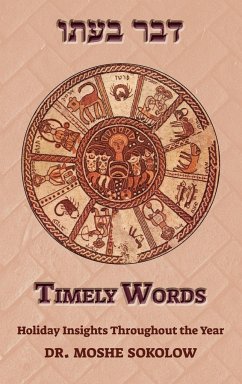
Immanuel Jakobovits
Gebundenes Buch
The Timely and the Timeless
Jews, Judaism and Society in a Storm-Tossed Decade
Versandkostenfrei!
Versandfertig in über 4 Wochen

PAYBACK Punkte
34 °P sammeln!




The Timely and the Timeless
Immanuel Jakobovits, Baron Jakobovits (8 February 1921 - 31 October 1999) was the Chief Rabbi of the United Hebrew Congregations of the Commonwealth from 1967 to 1991. Prior to this, he had served as Chief Rabbi of Ireland and as rabbi of the Fifth Avenue Synagogue in New York City. In addition to his official duties he was regarded as an authority in medical ethics from a Jewish standpoint. He was knighted in 1981 and became the first Chief Rabbi to enter the House of Lords in 1988 as Baron Jakobovits was a firm adherent of the "German-Jewish" Torah im Derech Eretz philosophy, having a broad knowledge of religious subjects as well as secular culture and philosophy. This made him a unique spokesperson for Orthodox Judaism, as he was able to transmit ideas to a wide audience which would otherwise not have achieved dissemination. Rabbi Jakobovits was the most prominent figure in 20th century Jewish medical ethics, a subdiscipline in applied ethics which he virtually created, and a pioneer in religious bioethics. His speciality was the interaction between medical ethics and halakha. Thanks to his academic training in Ireland, Rabbi Jakobovits approached his comprehensive volume, Jewish Medical Ethics, in light of Roman Catholic medical ethics, with which he often compares Jewish ethics. Whether developing or disputing his analysis, subsequent Jewish bioethicists have utilised his work on abortion, euthanasia, the history of Jewish medical ethics, palliative care, treatment of the sick, and professional duties. Likewise, he is credited with popularizing the fact that Judaism supports the nearly absolute sanctity of life. His political stance was conservative, and he was particularly close to Margaret Thatcher. When a Church of England report titled Faith in the City was published in December 1985 criticising Mrs. Thatcher's policies, Jakobovits responded by attacking its underlying philosophy.[2] Jakobovits argued that work rather than welfare should be the over-riding aim of government policy: "Cheap labour is better than a free dole".[7] More controversially, Jakobovits contended that inner-city black people should learn from Jewish experiences in America. There, he argued, Jews had worked themselves out of poverty, educated themselves, integrated into the host culture and nurtured a "trust in and respect for the police, realising that our security as a minority depended on law and order being maintained".[7] Jakobovits also took a conservative view on trade unions, criticised "Faith in the City" for not mentioning the role of trade unions, arguing that "The selfishness of workers in attempting to secure better conditions at the cost of rising unemployment and immense public misery can be just as morally indefensible as the rapaciousness of the wealthy in exploiting the working class". Within Judaism, he held mildly Zionistic views. He maintained that sooner or later Israel would need to negotiate the territory it conquered during the Six Day War; which made him a controversial figure, as he mentioned these views publicly.
Produktdetails
- Verlag: Vallentine Mitchell
- Seitenzahl: 437
- Erscheinungstermin: 1. März 1977
- Englisch
- Abmessung: 229mm x 152mm x 38mm
- Gewicht: 803g
- ISBN-13: 9780853031895
- ISBN-10: 0853031894
- Artikelnr.: 24954218
Herstellerkennzeichnung
Libri GmbH
Europaallee 1
36244 Bad Hersfeld
gpsr@libri.de
Für dieses Produkt wurde noch keine Bewertung abgegeben. Wir würden uns sehr freuen, wenn du die erste Bewertung schreibst!
Eine Bewertung schreiben
Eine Bewertung schreiben
Andere Kunden interessierten sich für











